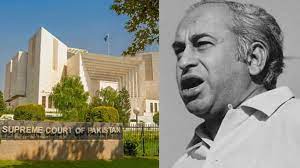By Staff Reporter
ISLAMABAD: The Supreme Court of Pakistan said on Wednesday that the trial that led to the execution of former Prime Minister Zulfikar Ali Bhutto in 1979 was unfair and violated his constitutional rights, but it stopped short of overturning his death sentence.
The court’s opinion, delivered by Chief Justice Qazi Faez Isa, was a rare acknowledgment of judicial error in a case that has haunted Pakistan’s history and politics for decades. Bhutto, the founder of the Pakistan Peoples Party and the father of former prime minister Benazir Bhutto, was hanged by the military regime headed by dictator General Zia ul Haq after being convicted of orchestrating the murder of a political rival.
The court’s opinion came in response to a presidential reference filed in 2011 by former President Asif Ali Zardari, Bhutto’s son-in-law and co-chairman of the PPP, who asked the court to revisit the verdict and declare it a “historic wrong.”
The court said it had the power to render an opinion on any question of law of public importance, but it could not change the verdict as the Constitution and law did not allow it. The verdict would remain part of the court’s record, but it would not affect the legal status of Bhutto or his heirs.
“The proceedings of the trial by the Lahore High Court and the appeal by the Supreme Court of Pakistan do not meet the requirements of the fundamental right to a fair trial and due process enshrined in Articles 4 and 9 of the Constitution and later guaranteed as a separate and fundamental right under Article 10A of the Constitution,” Justice Isa said.
He added that the court had to confront its past mistakes and ensure that justice was served with integrity and fidelity to the law. “We cannot correct ourselves and progress in the right direction until we acknowledge our past mistakes.”
The top court acknowledged that there had been “some cases in our judicial history that created a public perception that either fear or favour deterred the performance of a duty to administer justice in accordance with the law”.
“We must therefore be willing to confront our past missteps and fallibilities with humility, in the spirit of self-accountability, and as a testament to our commitment to ensure that justice must be served with unwavering integrity and fidelity to the law.”
The court’s opinion was announced in a live broadcast on its website and YouTube channel, a rare occurrence in Pakistan’s judicial history.
As the opinion was read out, Bhutto’s grandson, Bilawal Bhutto-Zardari, the current chairman of the PPP, stood solemnly in the courtroom, wiping his eyes and face with a handkerchief.
Bhutto-Zardari later spoke to reporters outside the court, calling the decision “historic” and saying he hoped it would pave the way for Pakistan’s progress and democracy.
“The stain of this decision made it difficult for the people of Pakistan to have faith in the court, and get justice from this court, especially if someone like the prime minister did not get justice,” he said.
Bhutto-Zardari thanked the judges and the lawyers who argued the case.
Bhutto, the first democratically elected prime minister of the country, was ousted in a military coup by Zia ul-Haq in 1977, and was arrested and charged with the murder of Muhammad Ahmed Khan Kasuri, a political opponent.
He was convicted and sentenced to death by the Lahore High Court in 1978, and his appeal was rejected by the Supreme Court in 1979 by a split decision of four to three.
Bhutto was hanged on April 4, 1979, despite international appeals for clemency. His supporters and many legal experts have long maintained that his trial was politically motivated and that he was denied a fair chance to defend himself.
His execution sparked protests and violence across the country, and cemented his legacy as a martyr for democracy.
The presidential reference, which was filed on the 32nd anniversary of his death, sought to rectify the “miscarriage of justice” and restore his dignity and honor. It also asked the court to consider the impact of the verdict on the constitutional and democratic system of the country.
The court heard arguments from both sides, as well as from amici curiae, or friends of the court, who were invited to assist the court. The court also examined the original record of the trial and the appeal, as well as the dissenting opinions of the three judges who voted to acquit Bhutto.
The court said it would issue a detailed opinion later, explaining its reasoning and findings. It also said it hoped that its opinion would not be used for political purposes or to undermine the judiciary.
Ahmed Raza Khan Kasuri, the complainant in the murder case, expressed his disappointment with the court’s opinion, saying it was based on “emotions and sentiments” rather than facts and law.
Kasuri said he feared that the opinion would open the floodgates for more references challenging the court’s verdicts.
Copyright © 2021 Independent Pakistan | All rights reserved




